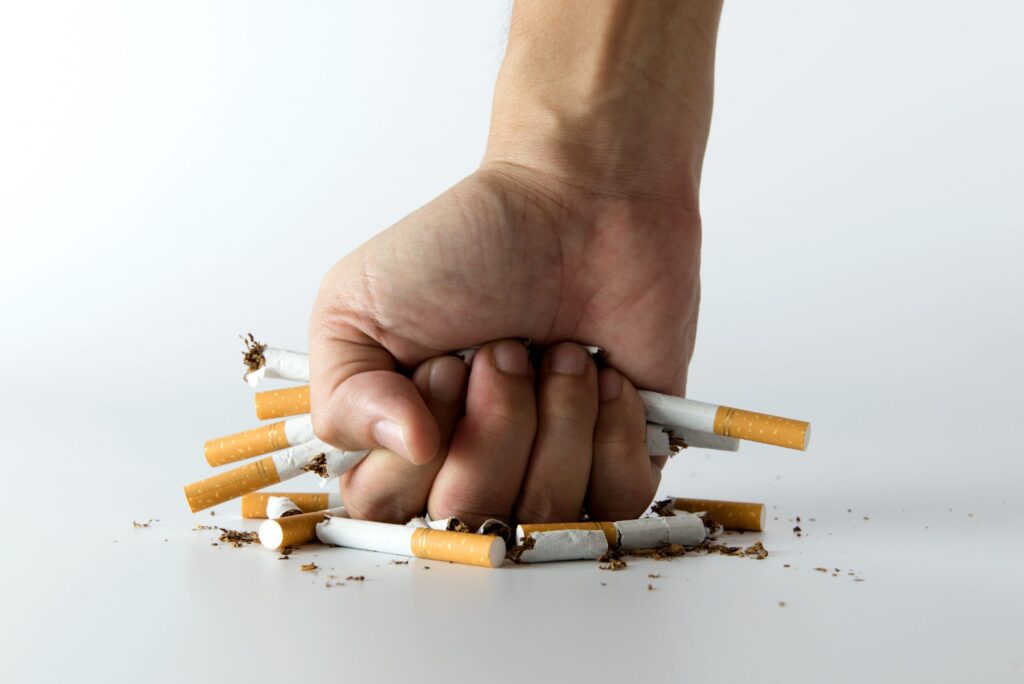Nine months into recovery, I ditched my two packs a day via a dinner intervention, Nicotine Anonymous and a short-lived crush. The revelations that followed were every bit as blinding as when I got sober.
 In early recovery, cigarettes felt as essential to me as breathing. They gave me something to do on my way to meetings, something to do on my way home from meetings and something to do during the smoke breaks during meetings. They gave me a way to bond with all the new people I encountered who scared me in ways I didn’t know how to talk about. They gave me something to do with my hands and mouth. They gave me a way to feel like I still had an edge. It’s no stretch to say that many addicts smoke.
In early recovery, cigarettes felt as essential to me as breathing. They gave me something to do on my way to meetings, something to do on my way home from meetings and something to do during the smoke breaks during meetings. They gave me a way to bond with all the new people I encountered who scared me in ways I didn’t know how to talk about. They gave me something to do with my hands and mouth. They gave me a way to feel like I still had an edge. It’s no stretch to say that many addicts smoke.
Studies about this topic sometimes report rates as high as 90%. Less known, it seems, are the studies that show that addicts who quit smoking when they first clean up have better chances of staying sober. I’ve only come upon these recently. If someone had mentioned them to me when I was a newcomer, I would have recoiled in horror.
In retrospect, it’s clear why cigarettes seemed the ideal early sobriety tool for me: They made me feel like I was doing something that was bringing me closer to people—while actually bringing me further away, because we were only bonding over a shared desire to take ourselves out of the moment. Because I didn’t know who I was yet, having 20 little buddies in my Camel Lights pack made me feel less alone.
“My cravings were so bad that I took to shoving every bit of sugar I could find in my mouth and chewing on pencils and sucking on hard candies and anything else I could think of.”
Then, when I was nine months sober, I met an older woman who’d been sober, it seemed, forever. She and I were at dinner with a few other sober friends after a meeting. As was routine for me, I went outside several times during the meal to smoke. And one of the times I returned, this woman started—in the most direct and yet gentle way imaginable—to confront me about it.
People had of course raised the topic with me before, but there was something different about her approach. She said things that made a lot of sense—that every time I inhaled on a cigarette, I was telling myself that I hated myself, and that getting sober but still smoking was like switching seats on the Titanic.
“Honey,” she told me, leaning forward on the table, “You’re putting a smoke screen between you and your Higher Power.” It was just the kind of sentiment I would have mocked pre-sobriety, but which made a lot of sense to the person I was becoming. At the end of dinner, she offered to meet me at a Nicotine Anonymous meeting the following evening. “Maybe,” I said, surprising myself.
She added that a sober guy I’d told her I had a crush on would probably be there.
“Okay,” I heard myself respond. “I’ll go.”
I really didn’t intend to quit. I smoked on the way home from dinner, and the next morning and the next day at work. But sometime around 3 pm that day, it occurred to me that it was possible I could really do this—quit. I decided to try not to smoke before the meeting and I made it those few hours.
I don’t remember much about that first Nicotine Anonymous meeting, aside from learning the word “smober”—something that people who don’t want to get mocked should probably never utter. (As a friend of mine says, “I already know I’m not cool; I don’t have to start saying the word smober to prove it.”)
The most significant aspect of that meeting for me—because I still didn’t really believe I was going to quit—was that my crush was there. He and I went for coffee afterwards, where he told me that he’d had sex with his cousin. I got sort of instantly over my crush.
But I didn’t smoke that night. And once I’d made it through, I felt like I could try to make it through the next day and the day after. Amazingly, I haven’t smoked since. That was on July 19, 2000.
This isn’t to say that it was easy. Quitting cigarettes was, for the first month, arguably the hardest thing I’ve ever done. My cravings were so bad that I took to shoving every bit of sugar I could find in my mouth and chewing on pencils and sucking on hard candies and anything else I could think of until it had passed. I would clutch the sides of chairs and tables and think about the things I heard in Nicotine Anonymous meetings—like that the craving would pass in five minutes, whether I smoked or not. I have no idea if that was true but it certainly helped at the time.
My withdrawal was debilitating. I remember walking into a Coffee Bean one of those mornings, attempting to buy a breakfast item of some sort and coming out clutching an egg salad sandwich, feeling like I’d lost control of my mind, my desires and my ability to form words.
I remember not getting picked to share during a Nicotine Anonymous meeting and feeling quite justified in going up to the speaker who hadn’t called on me afterwards and telling her how angry I was about this. The progress I’d made in the nine months since getting sober came to an abrupt halt; I acted out far more and paused far less.
But after a few more months, I realized something shocking: It just wasn’t that bad. I felt so much better being able to breath, my clothes didn’t stink and life just got easier. And there was something incredibly liberating about stepping into reality.
For me to know what cigarettes could do to me and still continue to smoke meant believing, on a certain level, that the rules didn’t apply to me—a delusion I’d operated under much of my life. Stripping that layer of denial away—admitting that smokes would kill me just as they would kill others—gave me a new taste of humility. I rediscovered—even more than I had when getting sober—that I wasn’t special, that I was just like everyone else.
By the time I’d reached the six-month mark, instead of craving cigarettes, I actually felt repulsed by smoking and amazed that I’d done it for as long as I had—13 years in all. My desire to do this thing that I’d needed to do constantly—up to two packs a day at times—was gone. I wasn’t resisting the temptation anymore; there was no temptation to resist.
Most of the sober people I know have eventually come to feel similarly. My friend Damien, who has over a decade of sobriety and quit smoking at eight-and-a-half years, even enjoyed the withdrawal. “It was like getting high,” he says. “The furious rush of my body screaming for nicotine was great. And it made me feel invincible—like, ‘Fuck. If I can do this, I can do anything.’ It just made everything rawer—anger, lust, sugar cravings, the smell of food and my clothing, hugging people. Also I had epic Technicolor dreams.”
While I don’t remember having any brightly colored dreams, I did get similar feelings of invincibility when I quit. But my most important realization probably came when I was sharing in a meeting about how I didn’t think I’d be able to do certain things that scared me—such as driving to interview someone who intimidated me, or talking to certain family members on the phone—without smoking. It was only after I shared that I realized that I was the one who’d decided that these things were so terrifying, and that if I’d been the one to give them the power to scare me, I could also take it away. Sucking down a cigarette didn’t prevent fear; I’d just been pretending that it did.
Still, in early sobriety, when I could barely do my laundry, let alone talk to near-strangers for hours without having something to medicate my extreme lack of self and inability to be in the moment, I don’t think I could have handled that. My friend Danny, who got sober in New York four years ago, feels similarly. Though he says he was never really addicted to cigarettes, he nevertheless smoked “a lot” during his first 90 days. “I think it actually helped me get sober,” he admits. “I made some close friends outside meetings that way.”
Other people I know are still, in long-term sobriety—and living in LA, where these days smokers are regarded with the sort of skepticism normally reserved for serial killers—fighting the nicotine battle. As my friend Mark says, “I’m truly powerless over nicotine. I’m a slave. And I’d rather kick dope 10 times over than cold turkey nicotine once.”
But peer pressure can work when it comes to positive as well as negative life choices: I’ve seen one person in a certain sober clique get sober, then watched the rest of the group follow, one by one. Sooner or later it seems, whether it’s in their first or 14th year, nearly all the sober people I’ve known seem to quit. It seems that once people get real-life supportive buddies, they have much less need of the 20 that come in a pack.



